2022届高考英语二轮复习:谓语动词的时态和语态课件(64张)
文档属性
| 名称 | 2022届高考英语二轮复习:谓语动词的时态和语态课件(64张) |  | |
| 格式 | zip | ||
| 文件大小 | 1.5MB | ||
| 资源类型 | 教案 | ||
| 版本资源 | 通用版 | ||
| 科目 | 英语 | ||
| 更新时间 | 2022-05-06 16:11:47 | ||
图片预览

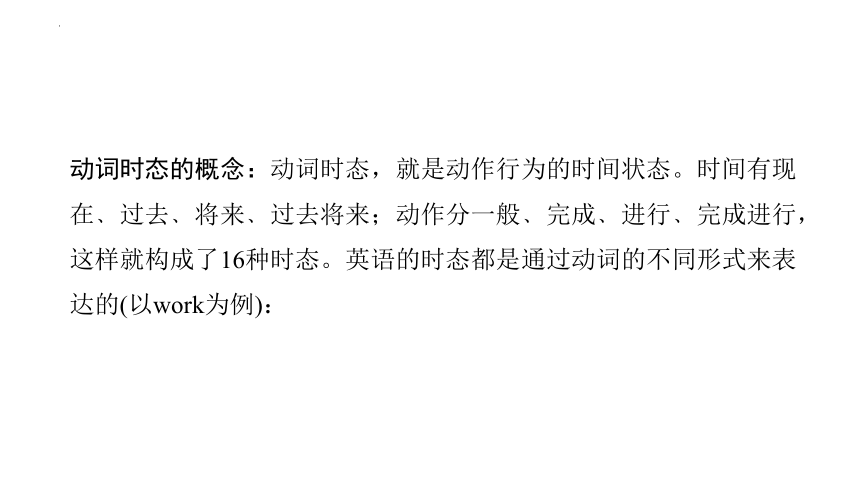
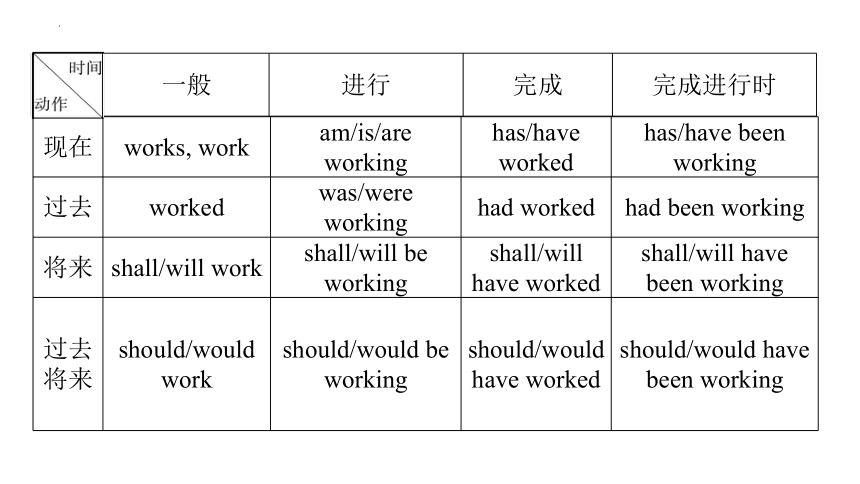
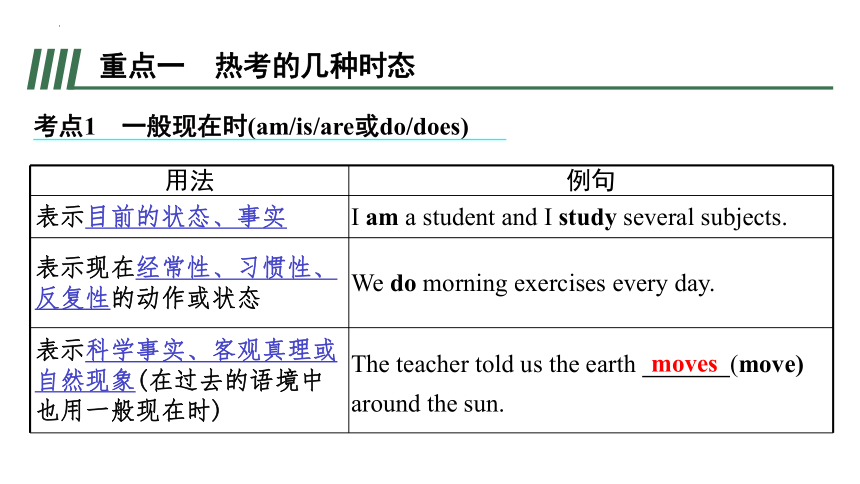
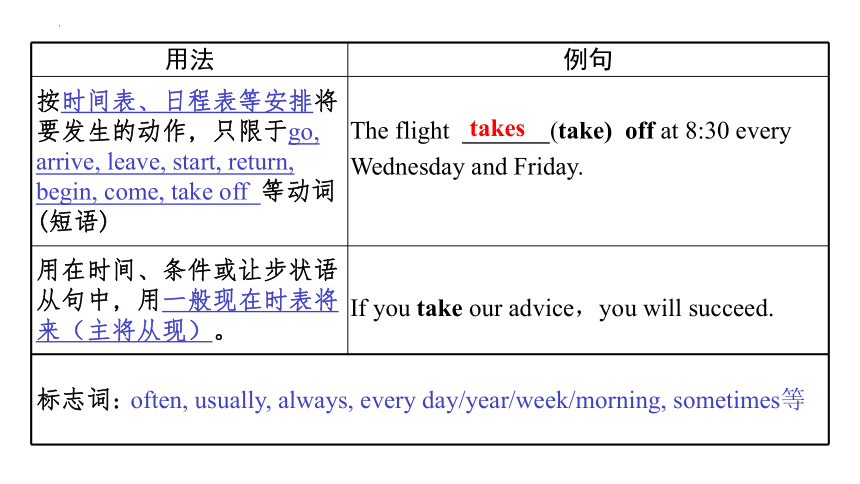
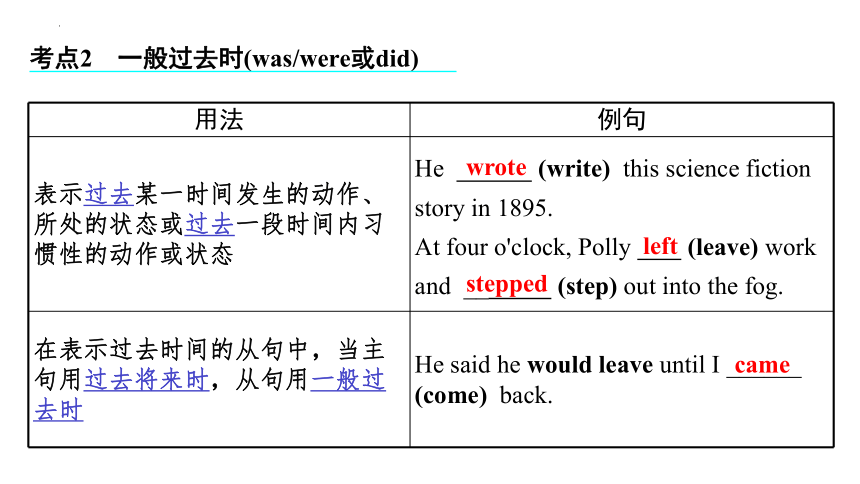
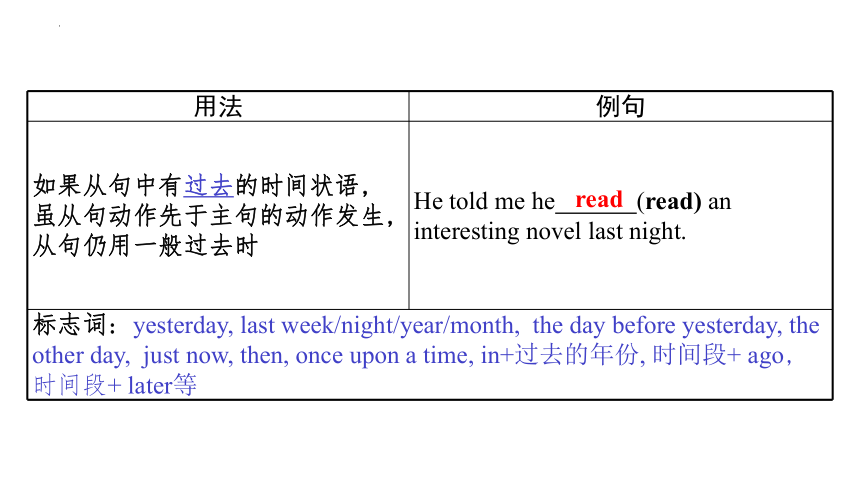
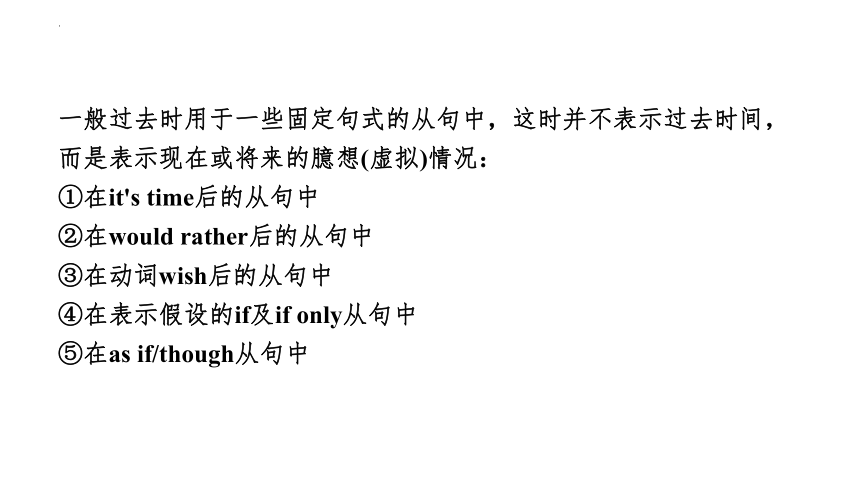

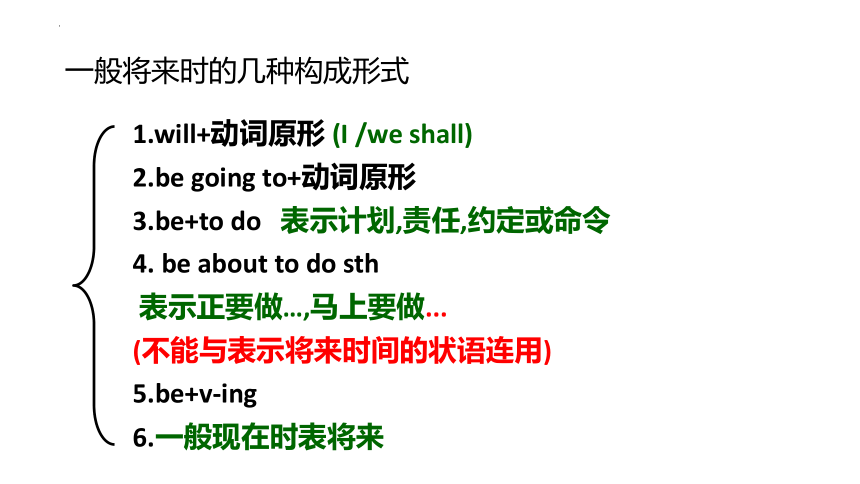
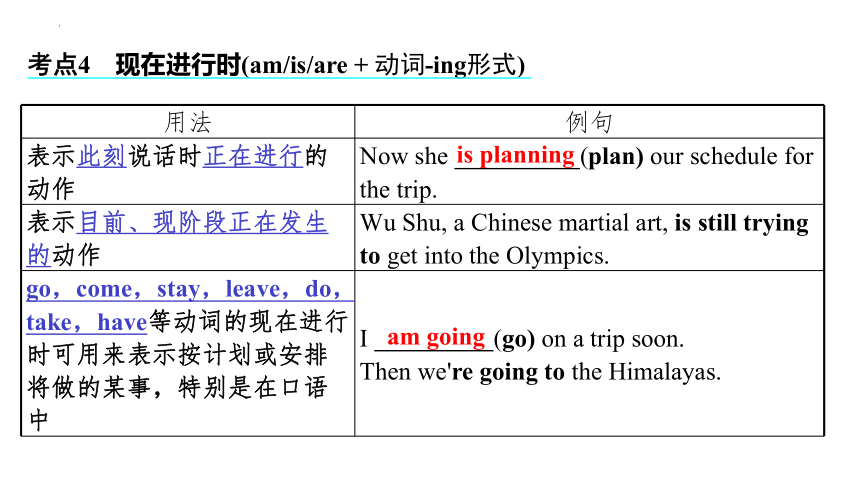
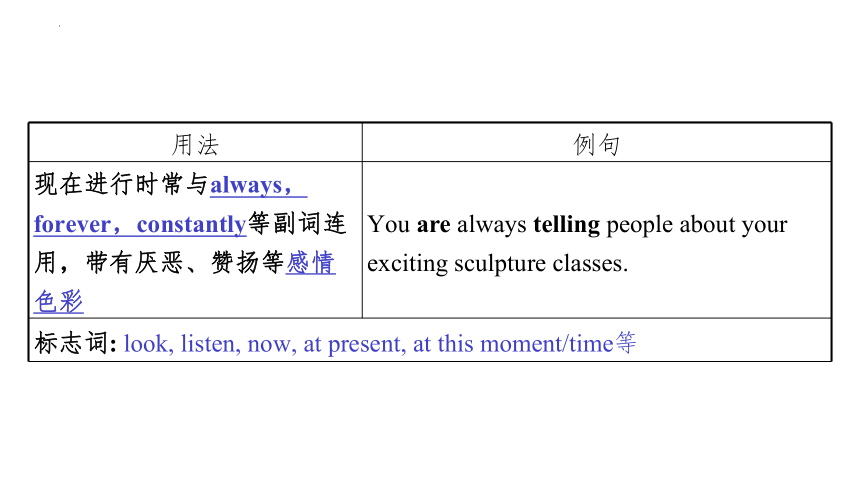
文档简介
(共64张PPT)
动词的时态和语态
动词时态的概念:动词时态,就是动作行为的时间状态。时间有现在﹑过去﹑将来﹑过去将来;动作分一般﹑完成﹑进行﹑完成进行,这样就构成了16种时态。英语的时态都是通过动词的不同形式来表达的(以work为例):
现在 works, work am/is/are working has/have worked has/have been working
过去 worked was/were working had worked had been working
将来 shall/will work shall/will be working shall/will have worked shall/will have been working
过去 将来 should/would work should/would be working should/would have worked should/would have been working
一般 进行 完成 完成进行时
重点一 热考的几种时态
考点1 一般现在时(am/is/are或do/does)
用法 例句
表示目前的状态、事实 I am a student and I study several subjects.
表示现在经常性、习惯性、反复性的动作或状态 We do morning exercises every day.
表示科学事实、客观真理或自然现象(在过去的语境中也用一般现在时) The teacher told us the earth (move) around the sun.
moves
用法 例句
按时间表、日程表等安排将要发生的动作, 只限于go, arrive, leave, start, return, begin, come, take off 等动词(短语) The flight (take) off at 8:30 every Wednesday and Friday.
用在时间、条件或让步状语从句中, 用一般现在时表将来(主将从现)。
If you take our advice,you will succeed.
标志词: often, usually, always, every day/year/week/morning, sometimes等
takes
考点2 一般过去时(was/were或did)
用法 例句
表示过去某一时间发生的动作、所处的状态或过去一段时间内习惯性的动作或状态 He (write) this science fiction story in 1895.
At four o'clock, Polly (leave) work and __ (step) out into the fog.
在表示过去时间的从句中,当主句用过去将来时,从句用一般过去时 He said he would leave until I ______ (come) back.
wrote
left
stepped
came
用法 例句
如果从句中有过去的时间状语, 虽从句动作先于主句的动作发生, 从句仍用一般过去时 He told me he (read) an interesting novel last night.
标志词: yesterday, last week/night/year/month, the day before yesterday, the other day, just now, then, once upon a time, in+过去的年份, 时间段+ ago, 时间段+ later等
read
一般过去时用于一些固定句式的从句中,这时并不表示过去时间,而是表示现在或将来的臆想(虚拟)情况:
①在it's time后的从句中
②在would rather后的从句中
③在动词wish后的从句中
④在表示假设的if及if only从句中
⑤在as if/though从句中
考点3 一般将来时(will/shall+ V原)
用法 例句
将要发生的动作或存在的状态 Next month we (have) our school open day.
Later,I (tell) you all about it.
将来反复发生的或习惯性动作 You (have) 3 P.E. lessons per week this term.
标志词: tomorrow,next week/year,in+段时间, in the future, soon, in a few minutes, by…, the day after tomorrow等
will have
will have
shall tell
一般将来时的几种构成形式
1.will+动词原形 (I /we shall)
2.be going to+动词原形
3.be+to do 表示计划,责任,约定或命令
4. be about to do sth
表示正要做…,马上要做...
(不能与表示将来时间的状语连用)
5.be+v-ing
6.一般现在时表将来
考点4 现在进行时(am/is/are + 动词-ing形式)
用法 例句
表示此刻说话时正在进行的动作 Now she (plan) our schedule for the trip.
表示目前、现阶段正在发生的动作 Wu Shu, a Chinese martial art, is still trying to get into the Olympics.
go,come,stay,leave,do,take,have等动词的现在进行时可用来表示按计划或安排将做的某事,特别是在口语中 I (go) on a trip soon.
Then we're going to the Himalayas.
is planning
am going
用法 例句
现在进行时常与always,forever,constantly等副词连用,带有厌恶、赞扬等感彩 You are always telling people about your exciting sculpture classes.
标志词: look, listen, now, at present, at this moment/time等
考点5 过去进行时(was/were + 动词-ing形式)
用法 例句
表示过去某一时间点正在进行的动作 May I ask what you (do) in my restaurant yesterday
表示过去某一段时间正在发生、进行的行为、动作 In those days we were having a hard time.
标志词: at that time/moment, this time yesterday,at 10 last night, this morning等
were doing
考点6 将来进行时(shall/will+be+动词-ing形式)
用法 例句
将来某个时刻或某个时间段正在进行或持续的动作 I am not really sure what I will be doing in ten years from now.
将来的安排打算 This time next week, I ______________ (arrive) in New York.
标志词: at six/this time tomorrow等
will be arriving
考点7 现在完成时(have/has+动词过去分词)
用法 例句
表示过去发生或已经完成的动作对现在造成的影响或结果, 常与up to/till/by now, so far, lately, recently(in recent years), already, yet, just, ever since, never, in/during/over the past/last +时间段等连用 In the last few years, thousands of films
(produce) throughout the world.
表示从过去开始一直持续到现在的动作或状态, 可能还会继续下去。往往和表示一段时间的时间状语连用, 如: for+时间段; since+过去时间点/从句 His first novel (receive) good reviews since it came out last month.
have been produced
have received
提示:
用现在完成时的常用句型:
①This/That/It is the first/second/...time+that从句, 从句用现在完成时。
②It has+been+时间段+since从句, 主句用现在完成时, 从句用一般过去时。
Tip: 一般过去时与现在完成时的区别
时态 功能 例句
一般过去时 过去的动作或状态。常用时间状语:yesterday,two days ago,与现在无关系 I was born in 1970.
I went to Changsha 3 days ago.
现在完成时 动作或状态与现在有关系,是过去的动作或状态对现在产生了结果或造成了影响。常用时间状语:already,just,yet,never,before等 He has come here. 他来了。(他现在在这了)
I have never been here. 我从来没来过这。
考点8 现在完成进行时(have/has+been+动词-ing形式)
用法 例句
表示从过去某一时刻开始, 一直持续到现在且仍在进行的动作。常与recently, since等连用 Tom (work) every night over the last three months.
现在完成进行时有时所表示的动作并不是一直在不停地进行, 而是在不断地重复发生 I (ring) you several times in two days.
标志词: now, these days, all this morning, these years等具有连续性意义的时间状语
has been working
have been ringing
现在完成进行时与现在完成时的区别如下:
1.现在完成时与现在完成进行时
I have written an article.
I have been writing an article.
2.有些延续性动词,如live, teach, work, study, learn, stay等因现在完成时与现在完成进行时差别不大。
I have lived here for ten years.
= I have been living here for ten years.
Notes:表短暂动作的动词(finish, marry, get up, come, go等)一般不能用现在完成进行时。
强调: 已完成性
强调: 持续性,未完成性
过去
现在
时间线
have written
have been writing
考点9 过去完成时(had+动词过去分词)
用法 例句
表示在过去某一时间或过去某一动作之前已经发生并完成的动作, 即“过去的过去” The film (begin) when we got to the cinema yesterday.
表示一个动作或状态从过去某一时间之前已经开始, 一直持续到过去这一时刻的动作 By the time Jack returned home from England, his son (graduate) from college.
had begun
had graduated
用法 例句
intend, mean, hope, want, plan, suppose, expect, think等动词用于过去完成时时, 可表过去未曾实现的愿望或意图 I (intend) to call on you yesterday, but I had an unexpected visitor.
标志词: by then, until then, by/before/by the end of +过去的时间点等
had intended
提示:
用过去完成时的常用句型:
①This/That/It was the first/second/... time+that 从句, 从句用过去完成时。
② “Hardly/Scarcely had+主语+动词过去分词... when...” 及 “No sooner had+主语+动词过去分词... than...”, 主句用过去完成时, 从句用一般过去时。
考点10 将来完成时(will/shall+have+动词过去分词)
用法 例句
表示从将来的某一时间开始、延续到另一个将来时间的动作或状态,或是发生在某个将来时间,但对其后的另一个将来时间有影响的动作或状态。 We _______________(learn) Book 8 by the end of next month.
I ________________(finish) the work by the time my father comes back.
标志词: by+将来时间, by the time引导的现在时从句
will have learned
will have finished
考点11 过去将来时(would/should+ V原)
用法 例句
从过去某时看将来发生的动作或存在的状态,常用于宾语从句 He said she would be there at seven o'clock, and he thought she would keep her word.
(was/were going to(was/were to)+动词原形可表示按计划、安排在过去某时即将发生的动作 ①He said he was going to start a new job.
②As I was to leave early the next day,I went to bed early on Thursday evening.
标志词: the next day(morning, year…),the following month(week…)等
过去将来时的其它表示:
Last Friday we decided we were going to the Great Wall.
It was reported that another bridge was to be built across the Yangtze River.
He didn’t know when you were coming.
He was about to dive when he saw a shark.
She was on the point of leaving when I arrived.
was / were going to do sth. 打算
was / were to do sth 打算、计划
was / were doing sth. 将要
was / were about to do sth. 就要、正要
was / were on the point of doing sth. 正要
句型:
…正在做某事,这时…
…正要去做某事,这时…
…就要去做某事,这时..
was / were doing sth. when …did sth.
was / were about to do sth. when …did sth.
Was / were on the point of doing sth. when … did sth.
重点二 动词的语态
1).被动语态的构成
现在 过去 将来 过去将来
一般 is/am/ are+动词过去分词 was/were+动词过去分词 will/shall+be+动词过去分词 would+be+动词过去分词
进行 is/am/ are+being+动词过去分词 was/were+being+动词过去分词 — —
完成 have/has+been+动词过去分词 had+been+动词过去分词 will/shall have+been+动词过去分词 would have+been+动词过去分词
被动语态的表示:
一般时态:
进行时态:
将来时态:
完成时态:
宁愿被:
最好被:
打算被:
过去常常被
情态动词
is / am / are /was /were done
is/ am / are/ was/ were being done
will/ would be done
have / has/ had been done
would rather be done
had better be done
be going to be done; be to be done
used to be done
情态动词+ be done
The book ______ (sell) well. By today 50,000 copies _______________(sell) out.
sells
have been sold
sell well 强调主语的特性,主动表被动。第二个 sell强调被卖掉的动作。
1. 表示主语的某种属性特征或功能的动词(lock, open, close, sell, bend, print, cut, wash, read, write, wear, tear, cook等)常与easily, well, smoothly, quickly, badly等副词连用。
易撕 书写流畅
易洗 好读
熟得快 打印质量差
易弯曲
tear easily
wash easily
cook quickly
bend easily
write smoothly
read smoothly
print badly
2).主动形式表示被动意义
I want to taste the food _________(smell) delicious. The method _________________(already, prove) practical.
smelling
has already proved
2. 系动词look, sound, taste, smell, feel, prove, remain, seem等后接形容词做表语
The novel is interesting __________(read). We find the box heavy __________(carry).
to read
to carry
3. Sth. is +adj. + to do.
I find/ think/ make/ feel sth. + adj. + to do. to do是主动表被动
The car ___________ (开不动了). The door of the classroom ___________ (锁不上).
won’t move
wouldn’t lock
4. 某些与won’t, can't, wouldn’t 连用的不及物动词如lock, open, close, move, print, shut等, 用主动表被动。
I have a letter _________(type), so I can’t go with you. With a lot of problems _________ (solve), I am at a loss now.
to type
to solve
5. have sth. to do; There is sth. to do.; with sth. to do. 有…要做
比较:He asked me if I had anything ___________ (type).
to be typed
type 的逻辑主语不是I,用have sth. to be done
It is I that _____________ (blame) for the incident.
am to blame
6. sb. is to blame (for sth.). 该怪…,…该负责任
The question is well worth ___________ (discuss). The naughty boy deserves __________(criticize).
discussing
7. sth. is (well) worth doing. 很值得(被)…
deserve doing …值得被…,…应该受到…
The computer needs ____________(repair).
repairing
8. sth. needs / wants / requires doing. 需要被…
criticizing
The car is too old __________(drive).
to drive
9. Sth. is too… to do . 太…而不能… Sth. is …enough to do. 足够…去…
10. 所有的不及物动词或不及物动词词组不能用于被动语态之中。
专题过关训练
Ⅰ.在空白处填入括号内单词的正确形式1. This glass ________ (break)easily, so please put a “Handle with Care” sticker on the box before you mail it.2.Hopefully in 2025 we will no longer be emailing each other, for we _________________ (develop) more convenient electronic communication tools by then.3.I first read the fashion magazine over a decade ago and ________ (subscribe)to it since.4.James has just arrived, but I didn't know he ___________________ (come) until yesterday.
breaks
will have developed
have subscribed
was coming/would come
5.A recent research shows that there ________ (be)volcanic activities on the moon and Mars.However, they no longer exist now.6.Life teaches us not to regret over yesterday, for it __________ (pass)and is beyond our control.7.I ______________ (watch)TV alone in the living room when I suddenly heard a crack upstairs.8.When making small talk at holiday parties, don't tell someone who ________ (lose)weight how amazing they look.That implies they looked terrible before.
were
has passed
was watching
has lost
9.Mr.Smith let off upon me the speech he ____________ (die)to make all along.10.Last year our team went to Seattle, Washington in the USA.We ________ (win) second place.11.The aging population________ (grow) each day.There must be some kind of interesting activity for the old.12.The manager got to the company in a hurry, only to find that he ________ (leave) his laptop back at home.
had been dying
won
is growing
had left
13.A boy on a bike ________ (catch) my attention.He was riding beside the bus and waving his arms.14.I heard that Carl ________ (win) the composition prize.15.In order to get good marks in the coming exam, my son _______________ (study) late every night in the past three weeks.
caught
had won
has been studying
THANK YOU !
动词的时态和语态
动词时态的概念:动词时态,就是动作行为的时间状态。时间有现在﹑过去﹑将来﹑过去将来;动作分一般﹑完成﹑进行﹑完成进行,这样就构成了16种时态。英语的时态都是通过动词的不同形式来表达的(以work为例):
现在 works, work am/is/are working has/have worked has/have been working
过去 worked was/were working had worked had been working
将来 shall/will work shall/will be working shall/will have worked shall/will have been working
过去 将来 should/would work should/would be working should/would have worked should/would have been working
一般 进行 完成 完成进行时
重点一 热考的几种时态
考点1 一般现在时(am/is/are或do/does)
用法 例句
表示目前的状态、事实 I am a student and I study several subjects.
表示现在经常性、习惯性、反复性的动作或状态 We do morning exercises every day.
表示科学事实、客观真理或自然现象(在过去的语境中也用一般现在时) The teacher told us the earth (move) around the sun.
moves
用法 例句
按时间表、日程表等安排将要发生的动作, 只限于go, arrive, leave, start, return, begin, come, take off 等动词(短语) The flight (take) off at 8:30 every Wednesday and Friday.
用在时间、条件或让步状语从句中, 用一般现在时表将来(主将从现)。
If you take our advice,you will succeed.
标志词: often, usually, always, every day/year/week/morning, sometimes等
takes
考点2 一般过去时(was/were或did)
用法 例句
表示过去某一时间发生的动作、所处的状态或过去一段时间内习惯性的动作或状态 He (write) this science fiction story in 1895.
At four o'clock, Polly (leave) work and __ (step) out into the fog.
在表示过去时间的从句中,当主句用过去将来时,从句用一般过去时 He said he would leave until I ______ (come) back.
wrote
left
stepped
came
用法 例句
如果从句中有过去的时间状语, 虽从句动作先于主句的动作发生, 从句仍用一般过去时 He told me he (read) an interesting novel last night.
标志词: yesterday, last week/night/year/month, the day before yesterday, the other day, just now, then, once upon a time, in+过去的年份, 时间段+ ago, 时间段+ later等
read
一般过去时用于一些固定句式的从句中,这时并不表示过去时间,而是表示现在或将来的臆想(虚拟)情况:
①在it's time后的从句中
②在would rather后的从句中
③在动词wish后的从句中
④在表示假设的if及if only从句中
⑤在as if/though从句中
考点3 一般将来时(will/shall+ V原)
用法 例句
将要发生的动作或存在的状态 Next month we (have) our school open day.
Later,I (tell) you all about it.
将来反复发生的或习惯性动作 You (have) 3 P.E. lessons per week this term.
标志词: tomorrow,next week/year,in+段时间, in the future, soon, in a few minutes, by…, the day after tomorrow等
will have
will have
shall tell
一般将来时的几种构成形式
1.will+动词原形 (I /we shall)
2.be going to+动词原形
3.be+to do 表示计划,责任,约定或命令
4. be about to do sth
表示正要做…,马上要做...
(不能与表示将来时间的状语连用)
5.be+v-ing
6.一般现在时表将来
考点4 现在进行时(am/is/are + 动词-ing形式)
用法 例句
表示此刻说话时正在进行的动作 Now she (plan) our schedule for the trip.
表示目前、现阶段正在发生的动作 Wu Shu, a Chinese martial art, is still trying to get into the Olympics.
go,come,stay,leave,do,take,have等动词的现在进行时可用来表示按计划或安排将做的某事,特别是在口语中 I (go) on a trip soon.
Then we're going to the Himalayas.
is planning
am going
用法 例句
现在进行时常与always,forever,constantly等副词连用,带有厌恶、赞扬等感彩 You are always telling people about your exciting sculpture classes.
标志词: look, listen, now, at present, at this moment/time等
考点5 过去进行时(was/were + 动词-ing形式)
用法 例句
表示过去某一时间点正在进行的动作 May I ask what you (do) in my restaurant yesterday
表示过去某一段时间正在发生、进行的行为、动作 In those days we were having a hard time.
标志词: at that time/moment, this time yesterday,at 10 last night, this morning等
were doing
考点6 将来进行时(shall/will+be+动词-ing形式)
用法 例句
将来某个时刻或某个时间段正在进行或持续的动作 I am not really sure what I will be doing in ten years from now.
将来的安排打算 This time next week, I ______________ (arrive) in New York.
标志词: at six/this time tomorrow等
will be arriving
考点7 现在完成时(have/has+动词过去分词)
用法 例句
表示过去发生或已经完成的动作对现在造成的影响或结果, 常与up to/till/by now, so far, lately, recently(in recent years), already, yet, just, ever since, never, in/during/over the past/last +时间段等连用 In the last few years, thousands of films
(produce) throughout the world.
表示从过去开始一直持续到现在的动作或状态, 可能还会继续下去。往往和表示一段时间的时间状语连用, 如: for+时间段; since+过去时间点/从句 His first novel (receive) good reviews since it came out last month.
have been produced
have received
提示:
用现在完成时的常用句型:
①This/That/It is the first/second/...time+that从句, 从句用现在完成时。
②It has+been+时间段+since从句, 主句用现在完成时, 从句用一般过去时。
Tip: 一般过去时与现在完成时的区别
时态 功能 例句
一般过去时 过去的动作或状态。常用时间状语:yesterday,two days ago,与现在无关系 I was born in 1970.
I went to Changsha 3 days ago.
现在完成时 动作或状态与现在有关系,是过去的动作或状态对现在产生了结果或造成了影响。常用时间状语:already,just,yet,never,before等 He has come here. 他来了。(他现在在这了)
I have never been here. 我从来没来过这。
考点8 现在完成进行时(have/has+been+动词-ing形式)
用法 例句
表示从过去某一时刻开始, 一直持续到现在且仍在进行的动作。常与recently, since等连用 Tom (work) every night over the last three months.
现在完成进行时有时所表示的动作并不是一直在不停地进行, 而是在不断地重复发生 I (ring) you several times in two days.
标志词: now, these days, all this morning, these years等具有连续性意义的时间状语
has been working
have been ringing
现在完成进行时与现在完成时的区别如下:
1.现在完成时与现在完成进行时
I have written an article.
I have been writing an article.
2.有些延续性动词,如live, teach, work, study, learn, stay等因现在完成时与现在完成进行时差别不大。
I have lived here for ten years.
= I have been living here for ten years.
Notes:表短暂动作的动词(finish, marry, get up, come, go等)一般不能用现在完成进行时。
强调: 已完成性
强调: 持续性,未完成性
过去
现在
时间线
have written
have been writing
考点9 过去完成时(had+动词过去分词)
用法 例句
表示在过去某一时间或过去某一动作之前已经发生并完成的动作, 即“过去的过去” The film (begin) when we got to the cinema yesterday.
表示一个动作或状态从过去某一时间之前已经开始, 一直持续到过去这一时刻的动作 By the time Jack returned home from England, his son (graduate) from college.
had begun
had graduated
用法 例句
intend, mean, hope, want, plan, suppose, expect, think等动词用于过去完成时时, 可表过去未曾实现的愿望或意图 I (intend) to call on you yesterday, but I had an unexpected visitor.
标志词: by then, until then, by/before/by the end of +过去的时间点等
had intended
提示:
用过去完成时的常用句型:
①This/That/It was the first/second/... time+that 从句, 从句用过去完成时。
② “Hardly/Scarcely had+主语+动词过去分词... when...” 及 “No sooner had+主语+动词过去分词... than...”, 主句用过去完成时, 从句用一般过去时。
考点10 将来完成时(will/shall+have+动词过去分词)
用法 例句
表示从将来的某一时间开始、延续到另一个将来时间的动作或状态,或是发生在某个将来时间,但对其后的另一个将来时间有影响的动作或状态。 We _______________(learn) Book 8 by the end of next month.
I ________________(finish) the work by the time my father comes back.
标志词: by+将来时间, by the time引导的现在时从句
will have learned
will have finished
考点11 过去将来时(would/should+ V原)
用法 例句
从过去某时看将来发生的动作或存在的状态,常用于宾语从句 He said she would be there at seven o'clock, and he thought she would keep her word.
(was/were going to(was/were to)+动词原形可表示按计划、安排在过去某时即将发生的动作 ①He said he was going to start a new job.
②As I was to leave early the next day,I went to bed early on Thursday evening.
标志词: the next day(morning, year…),the following month(week…)等
过去将来时的其它表示:
Last Friday we decided we were going to the Great Wall.
It was reported that another bridge was to be built across the Yangtze River.
He didn’t know when you were coming.
He was about to dive when he saw a shark.
She was on the point of leaving when I arrived.
was / were going to do sth. 打算
was / were to do sth 打算、计划
was / were doing sth. 将要
was / were about to do sth. 就要、正要
was / were on the point of doing sth. 正要
句型:
…正在做某事,这时…
…正要去做某事,这时…
…就要去做某事,这时..
was / were doing sth. when …did sth.
was / were about to do sth. when …did sth.
Was / were on the point of doing sth. when … did sth.
重点二 动词的语态
1).被动语态的构成
现在 过去 将来 过去将来
一般 is/am/ are+动词过去分词 was/were+动词过去分词 will/shall+be+动词过去分词 would+be+动词过去分词
进行 is/am/ are+being+动词过去分词 was/were+being+动词过去分词 — —
完成 have/has+been+动词过去分词 had+been+动词过去分词 will/shall have+been+动词过去分词 would have+been+动词过去分词
被动语态的表示:
一般时态:
进行时态:
将来时态:
完成时态:
宁愿被:
最好被:
打算被:
过去常常被
情态动词
is / am / are /was /were done
is/ am / are/ was/ were being done
will/ would be done
have / has/ had been done
would rather be done
had better be done
be going to be done; be to be done
used to be done
情态动词+ be done
The book ______ (sell) well. By today 50,000 copies _______________(sell) out.
sells
have been sold
sell well 强调主语的特性,主动表被动。第二个 sell强调被卖掉的动作。
1. 表示主语的某种属性特征或功能的动词(lock, open, close, sell, bend, print, cut, wash, read, write, wear, tear, cook等)常与easily, well, smoothly, quickly, badly等副词连用。
易撕 书写流畅
易洗 好读
熟得快 打印质量差
易弯曲
tear easily
wash easily
cook quickly
bend easily
write smoothly
read smoothly
print badly
2).主动形式表示被动意义
I want to taste the food _________(smell) delicious. The method _________________(already, prove) practical.
smelling
has already proved
2. 系动词look, sound, taste, smell, feel, prove, remain, seem等后接形容词做表语
The novel is interesting __________(read). We find the box heavy __________(carry).
to read
to carry
3. Sth. is +adj. + to do.
I find/ think/ make/ feel sth. + adj. + to do. to do是主动表被动
The car ___________ (开不动了). The door of the classroom ___________ (锁不上).
won’t move
wouldn’t lock
4. 某些与won’t, can't, wouldn’t 连用的不及物动词如lock, open, close, move, print, shut等, 用主动表被动。
I have a letter _________(type), so I can’t go with you. With a lot of problems _________ (solve), I am at a loss now.
to type
to solve
5. have sth. to do; There is sth. to do.; with sth. to do. 有…要做
比较:He asked me if I had anything ___________ (type).
to be typed
type 的逻辑主语不是I,用have sth. to be done
It is I that _____________ (blame) for the incident.
am to blame
6. sb. is to blame (for sth.). 该怪…,…该负责任
The question is well worth ___________ (discuss). The naughty boy deserves __________(criticize).
discussing
7. sth. is (well) worth doing. 很值得(被)…
deserve doing …值得被…,…应该受到…
The computer needs ____________(repair).
repairing
8. sth. needs / wants / requires doing. 需要被…
criticizing
The car is too old __________(drive).
to drive
9. Sth. is too… to do . 太…而不能… Sth. is …enough to do. 足够…去…
10. 所有的不及物动词或不及物动词词组不能用于被动语态之中。
专题过关训练
Ⅰ.在空白处填入括号内单词的正确形式1. This glass ________ (break)easily, so please put a “Handle with Care” sticker on the box before you mail it.2.Hopefully in 2025 we will no longer be emailing each other, for we _________________ (develop) more convenient electronic communication tools by then.3.I first read the fashion magazine over a decade ago and ________ (subscribe)to it since.4.James has just arrived, but I didn't know he ___________________ (come) until yesterday.
breaks
will have developed
have subscribed
was coming/would come
5.A recent research shows that there ________ (be)volcanic activities on the moon and Mars.However, they no longer exist now.6.Life teaches us not to regret over yesterday, for it __________ (pass)and is beyond our control.7.I ______________ (watch)TV alone in the living room when I suddenly heard a crack upstairs.8.When making small talk at holiday parties, don't tell someone who ________ (lose)weight how amazing they look.That implies they looked terrible before.
were
has passed
was watching
has lost
9.Mr.Smith let off upon me the speech he ____________ (die)to make all along.10.Last year our team went to Seattle, Washington in the USA.We ________ (win) second place.11.The aging population________ (grow) each day.There must be some kind of interesting activity for the old.12.The manager got to the company in a hurry, only to find that he ________ (leave) his laptop back at home.
had been dying
won
is growing
had left
13.A boy on a bike ________ (catch) my attention.He was riding beside the bus and waving his arms.14.I heard that Carl ________ (win) the composition prize.15.In order to get good marks in the coming exam, my son _______________ (study) late every night in the past three weeks.
caught
had won
has been studying
THANK YOU !
